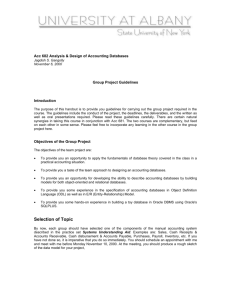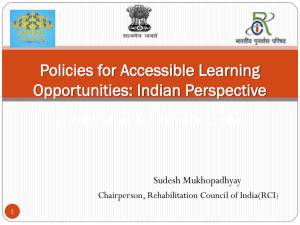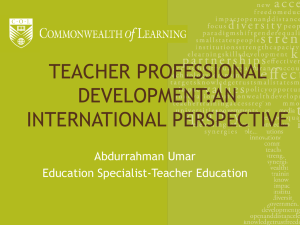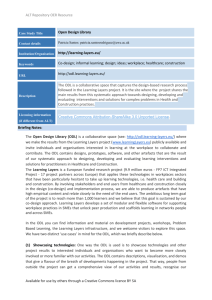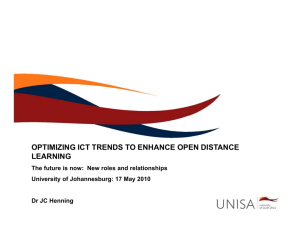4. Foregrounding ODL through a collaborative strategy
advertisement
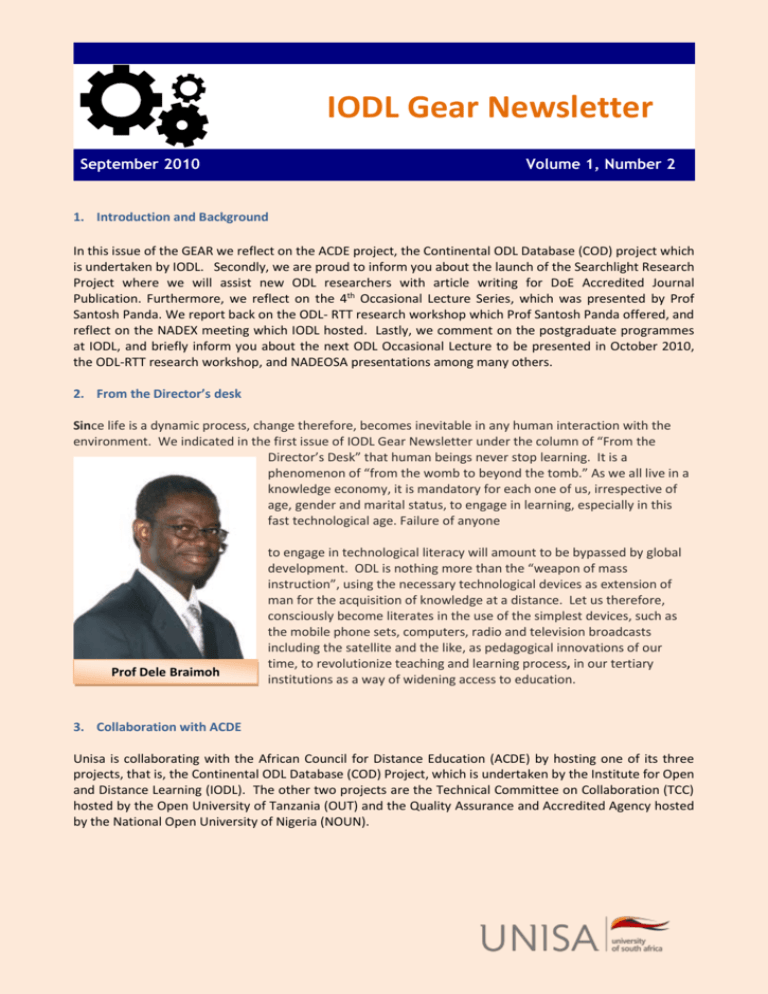
IODL Gear Newsletter September 2010 Volume 1, Number 2 1. Introduction and Background In this issue of the GEAR we reflect on the ACDE project, the Continental ODL Database (COD) project which is undertaken by IODL. Secondly, we are proud to inform you about the launch of the Searchlight Research Project where we will assist new ODL researchers with article writing for DoE Accredited Journal Publication. Furthermore, we reflect on the 4th Occasional Lecture Series, which was presented by Prof Santosh Panda. We report back on the ODL- RTT research workshop which Prof Santosh Panda offered, and reflect on the NADEX meeting which IODL hosted. Lastly, we comment on the postgraduate programmes at IODL, and briefly inform you about the next ODL Occasional Lecture to be presented in October 2010, the ODL-RTT research workshop, and NADEOSA presentations among many others. 2. From the Director’s desk Since life is a dynamic process, change therefore, becomes inevitable in any human interaction with the environment. We indicated in the first issue of IODL Gear Newsletter under the column of “From the Director’s Desk” that human beings never stop learning. It is a phenomenon of “from the womb to beyond the tomb.” As we all live in a knowledge economy, it is mandatory for each one of us, irrespective of age, gender and marital status, to engage in learning, especially in this fast technological age. Failure of anyone Prof Dele Braimoh to engage in technological literacy will amount to be bypassed by global development. ODL is nothing more than the “weapon of mass instruction”, using the necessary technological devices as extension of man for the acquisition of knowledge at a distance. Let us therefore, consciously become literates in the use of the simplest devices, such as the mobile phone sets, computers, radio and television broadcasts including the satellite and the like, as pedagogical innovations of our time, to revolutionize teaching and learning process, in our tertiary institutions as a way of widening access to education. 3. Collaboration with ACDE Unisa is collaborating with the African Council for Distance Education (ACDE) by hosting one of its three projects, that is, the Continental ODL Database (COD) Project, which is undertaken by the Institute for Open and Distance Learning (IODL). The other two projects are the Technical Committee on Collaboration (TCC) hosted by the Open University of Tanzania (OUT) and the Quality Assurance and Accredited Agency hosted by the National Open University of Nigeria (NOUN). Prof Dele Braimoh, the UNESCO Chair of ODL and Director of IODL at Unisa and Dr. Joe Diescho, the Director for International Relations and Partnership, represented UNISA at the ACDE Collaboration workshop which was held from 22-23 July, 2010, at the Giraffe Ocean View Hotel in Dar-Es-Salaam, Tanzania, and hosted by the Open University of Tanzania. Prof Braimoh’s presentation at the workshop focused on a review of the rationale, objectives, current status of the Continental ODL Database Project and the strategic implications of the project for synergizing with the TCC and the QAAA projects of the other two Institutions. The communiqué issued at the end of the workshop mapped the way forward regarding the collaboration framework including the plan of action for the years ahead. This will include the ODL Institutional Audit and the issue of Open Educational Resource (OER). Participants at the Giraffe Ocean View Hotel in Dar-Es-Salaam, Tanzania 3. Mainstreaming of ODL research and increased research output The DISA information and analysis briefing on Research Outputs in South Africa Public Higher Education for 2008, reveals that Unisa occupies the 12th position among Higher Educational Institutions in South Africa, in terms of research outputs per academic staff. In 2008, Unisa produced 0,72 research outputs per academic, which is considerably lower than the Ministerial approved norm of 1,16 for Unisa. During the strategic planning meeting of the ODL Research Task Team (ODL- RTT) in 2009, the ODL- RTT members discussed ways of assisting Unisa academic staff members to write ODL research articles, which may then be published in DoE Accredited journals. One suggestion was to provide a community of practice where researchers could present their work and academics could access peer reviews in a conducive and non-threatening way before sending the work to publishers. The Searchlight Research Project was born, and the research writing workshop as the launch of the project was discussed and decided upon. The ODL Research Searchlight Project is an initiative of IODL, working together under the operational umbrella of ODL-RTT, SENREC. The Searchlight Research Writing Workshop was conceptualised by the ODL- RTT and is conducted in collaboration with the Research Directorate, DCLD and the School of Graduate Studies. Academics were 2 invited to submit their abstracts based on ODL research projects. The response was overwhelming, which was an indication that we are pushing the Searchlight in the right direction. We selected 16 candidates who will attend an off campus workshop at Leriba Lodge during September and later a two-day work session in October for the final editing of their articles. Four academics from Unisa will facilitate the writing workshop, in guiding the candidates in the process of ODL research writing for publication in DoE Accredited Journals. Watch this space for the Searchlight on the deliverables on this exciting workshop during September 2010. 4. Foregrounding ODL through a collaborative strategy The Institute for Open and Distance Learning (IODL) hosted the 4th lecture of the ODL Occasional Lecture Series for 2010 and invited Prof Santosh Panda from the University of the South Pacific, Fiji Islands, to be the guest speaker on the day. With his talk entitled “Social software, social networks and online distance learning”, Prof Panda’s knowledge and extensive publishing in the areas of open, distance and online learning drew a large interested academic audience. Unisa’s Pro-Vice-Chancellor, Prof Mandla Makhanya gave a welcome address at the event. His address touched on the evolution of technology. He stressed that “Gone are the days when we would rush over to the library, or read through the encyclopedia when we needed information of any nature.” He pointed out that many can’t even remember a time when there were no computers. Vocabulary has also changed drastically, with words such as “Facebook”, “Twitter”, “Mxit” and “Clouds” on many people’s lips. This talk was thus a great platform to discuss how technology has shaped learning. With technology continuing to have a significant impact on higher education, Prof Panda delved into three significant areas: social technologies and social networking, social learning and community of practice, and finally social Prof Santosh Panda from the University of the South Pacific technologies, networking and online distance learning. His presentation critically analysed the significant use of various social software and social networks in teaching and learning. “The technologies and networks are basically online, and therefore, have the greatest potentiality to facilitate/influence learning which is web-based as well as online,” said Prof Panda. Touching on the use of Ning, Facebook, Elgg and Groupsite, Prof Panda said that “these sites provide opportunity for practice of making connections to like-minded people for expanding knowledge, and the users can customize their personal space and still connect to the group.” Social software and social technologies are reinforcing the reality of the past, that is, that technology is used by “technology converts” (and not necessarily the new converts). According to Prof Panda, it empowers those who are already confident in using technology, thereby enabling learning rather than addressing new learning styles. He asserted, though, that dialogue has always been the hallmark of educational discourse – both online and offline while social software may encourage identity congruence, it may also be disadvantageous to others. 3 Prof Dele Braimoh (Director, IODL -UNISA), Prof Santosh Panda (Director, Centre for Flexible & Distance Learning, South Pacific, Suva, Fidji islands), Prof MS Makhanya (Pro Vice Chancellor, UNISA) 5. IODL organized a practical ODL research workshop As part of the drive to stimulate ODL research interest among Unisa staff members, and in responding to the challenge of the COL’s Institutional Audit Report of 2007 which requires ODL research output to increase by 10% by 2015, the Institute for Open and Distance Learning (IODL) has rolled up its sleeves to meet this challenge by conducting regular and practical ODL research workshops. On Friday 30 July 2010, representatives from all of Unisa’s colleges, the Library and various regions attended a one-day, hands-on ODL research workshop. Prof Santosh Panda from the University of the South Pacific, Suva, Fiji Islands, facilitated the workshop entitled “Research distance and online learning”. Many people began their adventure into the land of ODL research at this workshop. The IODL announced at the workshop that a bigger and more practical writing workshop would be held sometime in September this year which is referred to above under the Searchlight Research Project. Prof Santosh Panda and participants at the recent ODL research workshop 6. The NADEX meeting ODL practice requires collaboration drive with other ODL organizations and institutions. For this singular reason, Unisa’s Institute for Open and Distance Learning hosted the Executive Committee meeting of the National Association for Distance Education and Open Learning of South Africa (NADEOSA) on Thursday 13 July 2010. 4 The meeting was attended by some of the executive members to discuss important issues such as research activities and the programme for next year. The members also reviewed the constitution in readiness for the annual general meeting and future membership of NADEOSA. Lastly, the members planned the activities for the Annual NADEOSA Conference which will be hosted by the North West University during September 2010 in Potchefstroom. Ms Jennie Glennie, also a member of the Nadex, participated through a teleconference arrangement. Members from the left: Ms Jenny Louw (NADEOSA Secretary), Mr Tony Mays (NADEOSA President), Prof Dele Braimoh (Former NADEOSA Vice President & now Executive Member), Ms Liana Griesel (NADEOSA current Vice President), Ms Rachel Prinsloo (Former NADEOSA President), Dr Johan Hendrikz (Current Executive Member) & Ms Seugnet Blignaut (Current NADEOSA Executive Member) 7. Postgraduate programme The postgraduate offerings at IODL include the Doctoral programme for the Research Assistants and the Masters with an ODL focus. Both programmes are offered in collaboration with the School of Education. The master's programme in ODL will commence from January, 2011. 7.1 Postgraduate Research Assistants at IODL August 2010 marked the first anniversary of the induction of Postgraduate Research Assistants into the IODL family. The three Research Assistants are doctoral students whose research focus is on various ODL niche areas. The Research Assistants experienced an intense and exciting first year of working at IODL and preparing their research proposals. They had the opportunity to attend and participate in workshops, seminars and ODL Lectures while working on their research proposals under the guidance and mentorship of Prof. Braimoh and Prof. Minnaar, as well as other senior academic staff in IODL. The programme which the Research Assistants adhere to, involves working on their doctoral studies while at the same time assisting in various activities of IODL. The various activities include, working with senior IODL staff members on the development of learning programmes organised by IODL, assisting in the ODL Occasional Lecture Series where scholars are invited to present a lecture at Unisa and report writing. The Research Assistants enjoy a collegial relationship with the rest of the IODL staff and also partake in all the interactive social activities, which form an integral part of the IODL culture. In this conducive work environment, the Research Assistants continue to develop both academically and professionally as a process of boosting their capacities in the academic environment. 5 8. Forthcoming activities The fifth lecture in the ODL Occasional Lecture Series will be held in October. Dr Charles Juwa will give this last lecture for this year. The title of the lecture is “The Impact of Technology on Distance Education: implications for developing countries” be the last for 2010. More of these exciting lectures are to be presented during 2011. Another ODL research workshop will be held during October 2010 at the Unisa main campus. 9. News in brief In order for IODL to mount wings like the eagle in catching up favourably with the challenges of its mandate, advertisements have gone out to fill its various academic vacant positions. Four of our staff members will be presenting papers at NADEOSA, 6-8 September 2010 in Potchefstroom. IODL Director, Prof Dele Braimoh, has been invited by the University of Ibadan, Ibadan, Nigeria, to give a keynote address at the first International ODL conference on “the challenges of Open Distance Learning in the Developing World,” from 5th -11th September, 2010, in Ibadan, Nigeria. 10. Conclusion 2010 has been an exciting year at IODL in many respects. During 2010, the Occasional Lecture Series focussed on technology and E-learning. We offered three Occasional Lectures this year. We are planning more exciting and ODL focussed Lectures for 2011. The theme for the Occasional Lecture Series for next year will be communicated to you in our next issue of our GEAR newsletter. We have reached out to the Unisa community and farther. We took ownership of the ADCE project where IODL and ICT will host the ACDE Data base with information on all ODL institutions in Africa. The Postgraduate programme at IODL is hive of activity in the sense that the Research Assistants are preparing their presentations for NADEOSA, while their conference research proposals and articles for publication in DE Accredited Journals are taking excellent shape. Please keep your eyes focussed on IODL for more ODL experiences and discussions! Further information is available from: The Institute for Open & Distance Learning Theo van Wijk building Room 10-156 Unisa, Muckleneuk Campus PO Box 392, Unisa 0003 Pretoria Telephone: +12 429-3250/3256/3259 Fax: +27 429-3630/6841 E-mail: www.unisa.ac.za/iodl Editorial Board Members Editor-in-chief: Prof Dele Braimoh Managing Editor: Prof Ansie Minnaar Editors & Production Staff: Ms Lydia Mbati, Dr Mpine Makoe, Dr Paul Prinsloo, Mrs Santa Parsons (Production Editor), Mr Aubrey Phala, Mrs Maphuti Mothoa & Mrs Lilian Momberere-Khumalo (Production and layout Assistants) 6
